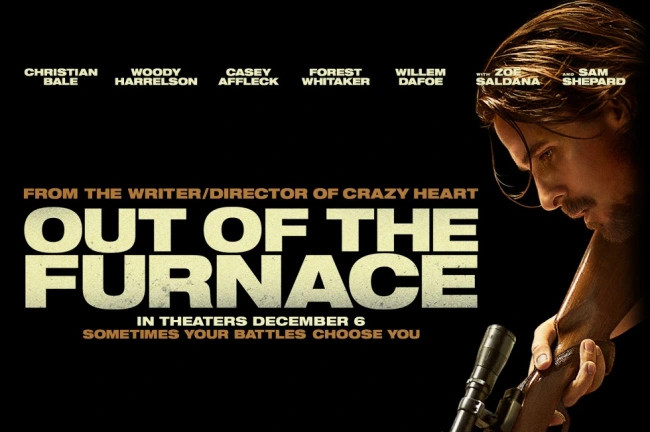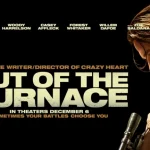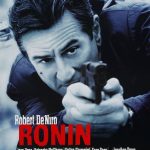Out of the Furnace (2013)

“Out of the Furnace,” directed by Scott Cooper and released in 2013, is a gripping crime drama that delves into themes of vengeance, despair, and the harsh realities of working-class life in America. Starring a powerhouse cast including Christian Bale, Casey Affleck, Zoe Saldana, and Woody Harrelson, the film paints a bleak yet compelling portrait of a man’s struggle against the forces of fate and the environment that shapes him.
Set in the economically depressed region of Pennsylvania, “Out of the Furnace” follows the story of Russell Baze (Christian Bale), a steelworker whose life spirals out of control following a series of tragic events. Russell embodies the struggles of many working-class Americans, faced with the harsh realities of job loss, economic instability, and personal tragedy. His character is a poignant representation of resilience, yet the film does not shy away from the despair that permeates his existence.
The film opens with Russell working at a steel mill, where he leads a monotonous life filled with the grind of labor. His relationship with his girlfriend, Lena (Zoe Saldana), adds a layer of warmth to his character, providing a glimpse of hope amid the bleakness. However, their lives take a tragic turn when Russell is involved in a fatal car accident that leads to his imprisonment. This event sets off a chain reaction of despair that reverberates throughout the film.
Upon his release, Russell discovers that his younger brother, Rodney (Casey Affleck), has become involved in the underground world of illegal boxing, drawn into the violent and dangerous lifestyle led by a ruthless drug dealer named Harlan DeGroat (Woody Harrelson). The contrast between Russell’s desire for a quiet life and Rodney’s reckless pursuit of quick money and fame serves as a central conflict in the film. As Russell tries to reconnect with his brother, he becomes increasingly aware of the perilous path Rodney has chosen.
Woody Harrelson delivers a chilling performance as Harlan DeGroat, a character who embodies the brutality and moral decay of the environment in which the film is set. Harrelson’s portrayal is both menacing and charismatic, showcasing the volatile nature of his character. DeGroat’s world is one of violence and desperation, and his interactions with Russell escalate the film’s tension and sense of impending doom.

The cinematography by Masanobu Takayanagi effectively captures the bleak landscape of rural Pennsylvania, enhancing the film’s themes of desolation and entrapment. The muted color palette and stark imagery reflect the emotional weight of the characters’ struggles, creating an atmosphere that is both haunting and immersive. Cooper’s direction ensures that every shot serves a purpose, contributing to the film’s overall tone of despair and urgency.

As the narrative unfolds, Russell finds himself caught in a web of violence and retribution. Driven by a fierce love for his brother and a desire to protect him, he takes matters into his own hands, leading to a harrowing confrontation with DeGroat. This climax serves as a powerful commentary on the cycles of violence that perpetuate in environments marked by desperation and poverty. The choices made by the characters often lead to tragic outcomes, highlighting the inescapable nature of their circumstances.
The film’s score, composed by Dickon Hinchliffe, complements the emotional depth of the story. The haunting melodies underscore the characters’ struggles, enhancing the film’s atmosphere and drawing viewers deeper into the narrative. The music serves as a poignant reminder of the pain and loss experienced by the characters, further immersing the audience in their plight.

At its core, “Out of the Furnace” is a meditation on the themes of family, loyalty, and the consequences of one’s choices. Russell’s journey illustrates the lengths to which one will go to protect loved ones, even when faced with insurmountable odds. The film poses important questions about morality and the impact of environment on individual choices, forcing viewers to confront the harsh realities faced by many in today’s society.

In conclusion, “Out of the Furnace” is a powerful and thought-provoking film that masterfully weaves together themes of violence, despair, and familial loyalty. Scott Cooper’s direction, combined with the outstanding performances of the cast, creates a haunting portrayal of life in a forgotten part of America. Christian Bale’s nuanced performance as Russell Baze is a standout, capturing the character’s internal struggles with authenticity and depth. The film’s atmospheric cinematography and evocative score further enhance its emotional impact, making it a poignant exploration of the human condition in the face of adversity. “Out of the Furnace” is a haunting reminder of the struggles that many endure, and it leaves viewers with lingering reflections on the choices that define us and the environments that shape our lives.











